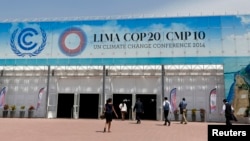Rich nations' pledges of almost $10 billion to a green fund to help poor nations cope with global warming are "far from adequate," particularly Australia's lack of a donation, the head of China's delegation at U.N. climate talks said on Thursday.
Su Wei also urged all rich nations to deepen their planned cuts in greenhouse gas emissions, signaling that a joint Chinese-U.S. announcement of greenhouse gas curbs last month does not mean an end to deep differences on climate policy.
Speaking during Dec. 1-12 talks in Lima, Su said donor pledges last month totaling $9.7 billion to a new U.N. Green Climate Fund (GCF), to help developing nations cut emissions and adapt to climate change, were only a small part of needed cash.
"It is far from adequate," he told a news conference, noting that developed nations in 2009 agreed to mobilize $100 billion a year from both public and private sources by 2020 to help poor nations suffering droughts, heat waves, floods and rising seas.
"There is still a large gap towards the 2020 targets of $100 billion a year," he said. Australia is the main developed nation that has not contributed to the GCF, saying it prefers for now to focus on domestic aid programs.
"It is not good news [about] Australia, if it is true that they refuse to provide any money to the GCF," Su said. The biggest donors to the GCF are the United States with up to $3 billion and Japan with $1.5 billion.
Delegates from about 190 nations are meeting in Lima to work on a U.N. climate deal due to be agreed in Paris next year. Developing nations had wanted $15 billion for the GCF by the start of the Lima talks to help spur progress.
Su also said that greenhouse gas cuts planned by rich nations before 2020 were far too small and urged a toughening.
In a joint announcement last month, Beijing said it would aim to peak its fast-rising emissions around 2030, the first time it has set a maximum year, and the United States said it would seek to cut emissions by 26 to 28 percent below 2005 levels by 2025.
Su said the joint announcement was intended to give momentum to the talks.
"A joint announcement does not necessarily blur the distinction between developed and developing countries," he said.





